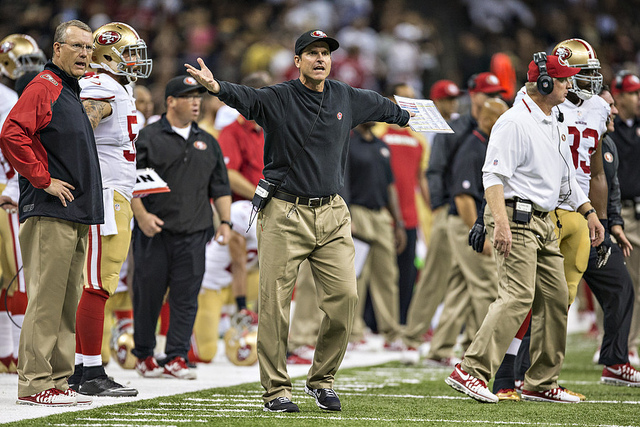
Jim Harbaugh, previously a coach for the San Francisco 49ers, signed a $35 million contract to coach the University of Michigan's football team. (Adam Rifkin/Flickr CC).
Big Ten champion Ohio State and Pac-12 champion Oregon will meet in Arlington, Texas, on Monday, January 12, in this country’s first College Football Championship game.
The Buckeyes and Ducks will take the field at a time when college sports have never been a bigger business. National Collegiate Athletic Association (NCAA) football and basketball is now a $16 billion dollar industry. In recent years, we’ve witnessed a dramatic rise in college football and basketball coach compensation while there are increasing concerns about academic issues, including graduation rates and admissions standards for athletes.
Last week, months after University of Michigan President Mark Schlissel raised questions about athletes' academic rigor, Jim Harbaugh signed a $35 million contract with Big Blue.
As The Washington Monthly reports, the “widening chasm between coaches and players is creating a growing economic, moral, and public relations challenge for college football.”
A burgeoning chorus of critics is calling out the NCAA for its hypocrisy. Some want market rates for college players, while others want more incremental changes—a combination of stipends, guaranteed four-year scholarships, better medical care, and financial control for players over their likenesses.
In his original radio documentary, Dropping the Ball: The Shady Side of Big-Time College Sports, PRI’s Bob Edwards explores whether American colleges and universities are giving athletes a quality education. We hear from professors who say athletes are receiving a segregated educational experience and from economists suggesting how to rein in the excesses of college sports.
Listen to Dropping the Ball: The Shady Side of Big-Time College Sports:
What do you think? Is the business of college sports out of control? What should college presidents do to rein in its excess?










